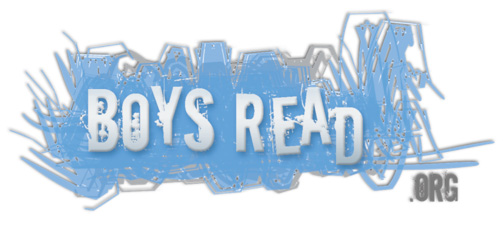 Turning boys into lifelong readers: An interview with BoysRead.org founder, John Martin
Turning boys into lifelong readers: An interview with BoysRead.org founder, John Martin
How did BoysRead.org come to be founded and what is its mission?
J. Martin: The mission of BoysRead.org is very clearly stated, and I don't think there is anyone who would object to it: To turn boys into lifelong readers. It is a challenge to do that.
I am a writer and a teacher, and I just saw — about five years ago — that there was a real lack of promotion of high-interest fiction titles for boys. Of course I knew that a wonderful body of literature was already out there, that there were many great books boys just weren't being exposed to. And a lot of the frustration, to be honest with you, came from my own experience submitting my books to publishers and hearing from them that I needed to "water them down." For instance, I have a novel about two boys in a prison camp and they're fighting, and one boy grabs a knife to defend himself. The publisher would say something like, "Can't you take these elements out — take the knife out, take the fighting out?" And I would say, "No, no I can't." Five, six years ago, we were so politically correct, averse to any kind of aggression.
So when I got started, I decided that I was going to publish books that boys — if not publishers — would like and also expose them to all these great books that I knew of that are already out there, like The Outsiders and The Chocolate Wars. That's how BoysRead.org came about.
We've already come a long way since I started. Lots of great boy-interest titles are being launched, and there are now some publishers that are only going to publish boy titles — that's a trend I've noticed in just the last few months. They see there is a viable market for it now.
What about girls?
J. Martin: Of course I'm always tempted to add content of interest to girls. But as soon as I do that, I'll be guilty of diluting the focus on where this huge reading-gap need is. So I try to stay focused. I also do most of my work in under-served student populations. Which certainly doesn't mean that parents in other socio-economic circumstances around the city and country don't have these same challenges with boys and reading.
You talk about the importance of being a "literate family" — what are steps to take to become a literate family?
J. Martin: One of the key steps is to have a wide body and variety of literature in your home. That means high-interest fiction, that means high-interest subject-matter nonfiction, that means poetry, and that also means digital access to literature in addition to printed books.
This is really the most important aspect: all members of a literate family must read. Probably the most critical thing when you look at turning boys into lifelong readers is that dad needs to read: it's not always the access to literature that's the problem, it's the absence of a male role model who reads — boys need to see dad or other male figures (say an older brother) read and reinforce that daily ritual of family reading.
What about digital literacy?
J. Martin: The hot thing right now is obviously e-readers like the Nook, Kindle, and iPad. But digital literacy is just one form of literacy, not a replacement. We know we're moving beyond the book in many ways, and I would even say — sarcastically — that the book is dead. As a printed medium, books appear to be becoming almost a novelty item. But literate families should be holding onto books.
As I tell my students, the beauty of the digital world is that it provides you access to a global body of literature, past and present, everything that has ever been written. Our access to knowledge through technology is right on and positive, but it shouldn't be our only exposure to literature. Meaning there is a whole other experience of literacy through printed materials that more fully engages all our senses — and digital literacy will never entice our senses in quite the same way. Viewing the illustrations of a book you love, smelling the yellowing pages of an old book, the feel of printed pages, running your finger over the raised print of a well-made novel — you'll never get that out of a digital book, no matter how brilliantly it is presented.
What materials, techniques, or resources do you provide for educators and parents?
J. Martin: The basis for my two-day workshop on turning boys into lifelong readers is teaching the technique of asking such subtle questions, questions that are open-ended, as opposed to close-ended. If you ask a boy if he likes to read or what books he likes, he may say, "No, and none." But if you say, "Do you like a good story?" — well, that might throw him off. Boys don't know how to respond to that question. It is a question that gets around their tripwires.
BoysRead.org at this stage is primarily a web-based resource for concerned educators and parents. The Best Books page is the most-viewed page on the site. There you'll find all kinds of authors and titles that appeal to boy readers. What I have found is that many people will ask me to provide a list of the top ten titles. For me, that's like pointing to a group of 500 children and asking me which one is my favorite. I expect people to do their own homework — get on the best books page, look for titles or authors that they know, read a few titles by the same author, and then move on to discover something similar.
And that is possibly the core component of transforming a boy into a lifelong reader: that very process of discovering where his interests lie. Also being diligent, never giving up on the process of conditioning an understanding that a change is needed. Boys must understand they need to read.
What are "Reading Tribes?"
J. Martin: Reading Tribes are essentially fun and informal reading circles designed to bond with boys over books. A "Tribe Leader" is an adult who helps mentor and facilitate the group — this can be a parent, teacher, librarian, bookseller, coach, or what have you.
Tribes are a great concept, but there are so many competing interests for kids right now that they can't be undertaken without forethought. My first piece of advice if you try one is to never refer to it as a book club! No one will show up for a "book club." Think of it this way: You can guess what answer you'll get if you ask a kid, "Do you want to do sword-fighting, or do you want to join a Reading Tribe?" But that's just what I will do with one of my Reading Tribes — we'll read about swords, we'll have a sword expert come in and talk to us about swords, and then we'll make cardboard swords and learn how to sword-fight with them. Now that approach to reading works.
I give general guidelines for committed educators to follow to do their own reading tribes on the website. Pick a book off the list, read it and be passionate about it, and see if you can stimulate the boys' interest in it with a good activity. And you can't make the Reading Tribe an optional afterschool activity — you need to make it an in-school activity. What will happen is that the boys will slowly get exposed to things, and you know you've had the breakthrough when you hear: "What else do you have...?"
What are key factors in creating success for boy readers in Reading Tribes?
J. Martin: One thing to note about reading literacy efforts with boys in general: they can and will participate and communicate by drawing. They have zero inhibitions about drawing and about sharing their drawings. So, you may not have so much luck asking a boy to talk or write about the reading material — to share his thoughts or feelings about the story or the protagonist — but if you encourage him to draw about it and share his drawings with you, he'll more than happily do so. Boys can't or won't articulate as well as girls do.
A related thing about boys participating in a Reading Tribe: there is no mandatory reading aloud. How would you feel to have to read aloud, stumbling and struggling below grade-level? Reluctant, humiliated. And public humiliation at that! I call that ineffective, shame-based learning.
Talk about the fourth grade reading slump.
J. Martin: Boys and girls typically like the same books up until about third grade. By fourth grade, they start developing gendered literary tastes, and that is the juncture where you can see a big drop-off in reading for boys. They stop reading because they are not being exposed to the type of books they like to read. We really want to address that during fourth grade.
Similarly, can you share any smart strategies for combating the dreaded summer reading slump?
J. Martin: It is so important to preserve reading as a family ritual during the summer. My daughter is 11, and I don't see any end to that in our lives. It is a bonding process we do every single night. It is important for all of us, and a lot of parents understand that family literacy has to be a diligent process, one you can't let slide. Especially in fourth grade, and especially with your boy. When a boy begins to develop, don't let that part of your relationship lapse. That reading ritual, that bond, always needs to be there.
Research shows there is a huge reading slump — or reading loss — in summer. There have been standardized tests given at the beginning of the summer and again at the end of summer, and the reading literacy scores go down. I call this reading atrophy. Parents need to be aware of that — don't stop reading during the summer! Research also shows that it has a cumulative effect — each summer there is a greater loss.
So, what can we do about that?
1. We honor our family reading ritual.
2. We offer reading incentives — read X number of books and earn a reward.
3. We provide constant exposure to literature. Many boys are only exposed to books during the school year, so when summer comes there is no exposure. This is where the local library comes in. As parents, as a family, you just have to be diligent about it.
4. Another one might be to set up a reading sanctuary in your home. A special reading nook or place, like a meditation sanctuary — a place dedicated for reading. When a family member retreats to that area, everyone needs to be quiet! Just little things like that.
5. If you can get it to that level, try a summer Reading Tribe.

John Martin is the founder of BoysRead.org. He writes middle-grade and YA novels, and works with educators and parents to motivate reluctant readers. Boys Read's mission is to transform boys into lifelong readers. The site is used as a resource by parents, librarians, and teachers. John has a BA in Speech Communications and an MA in Organizational Communications. He lives in Seattle with his wife and 11-year-old daughter.











